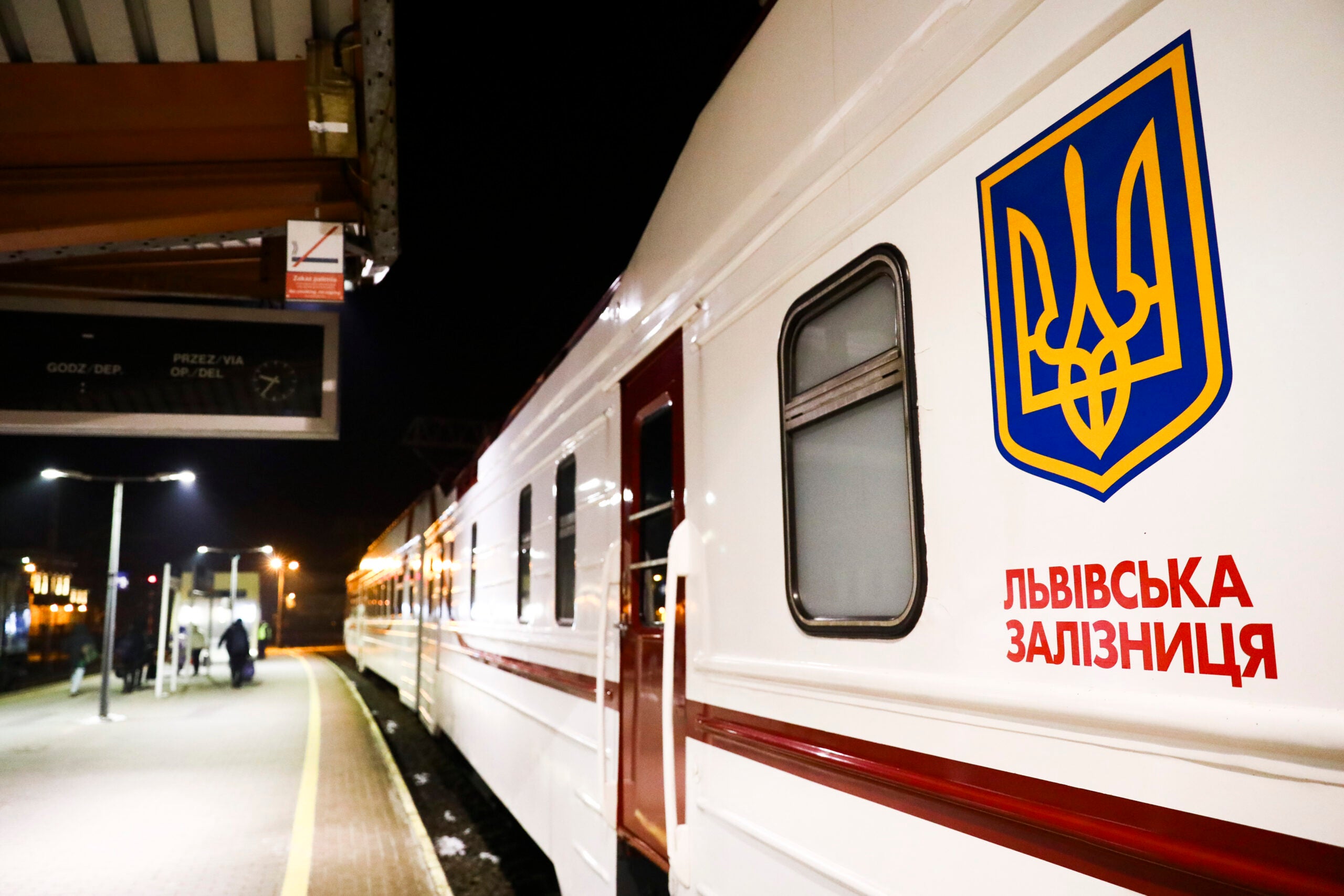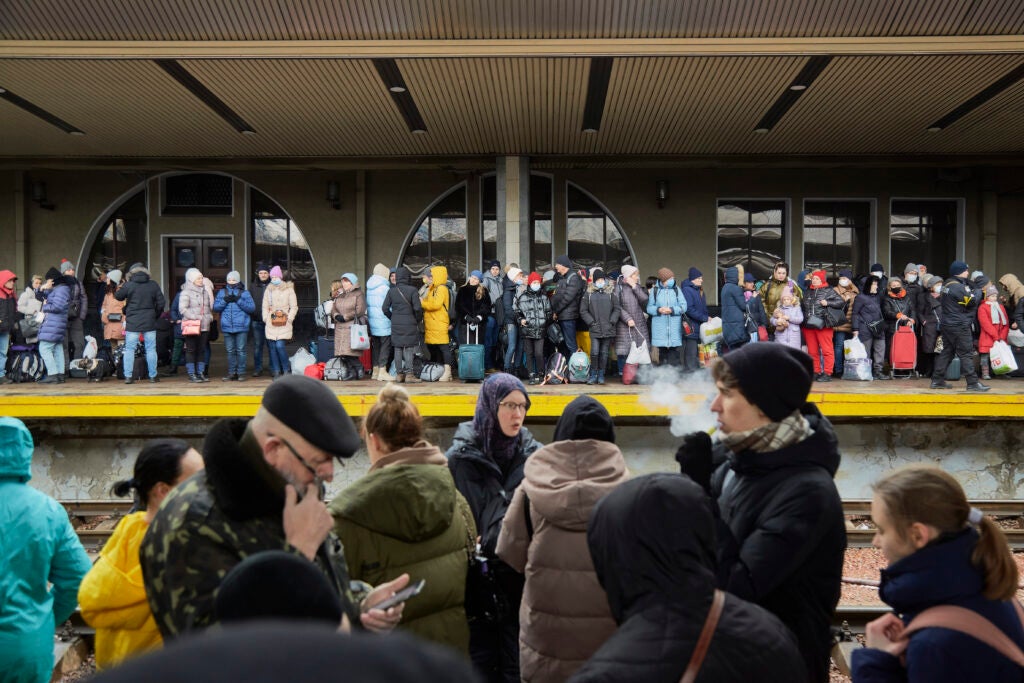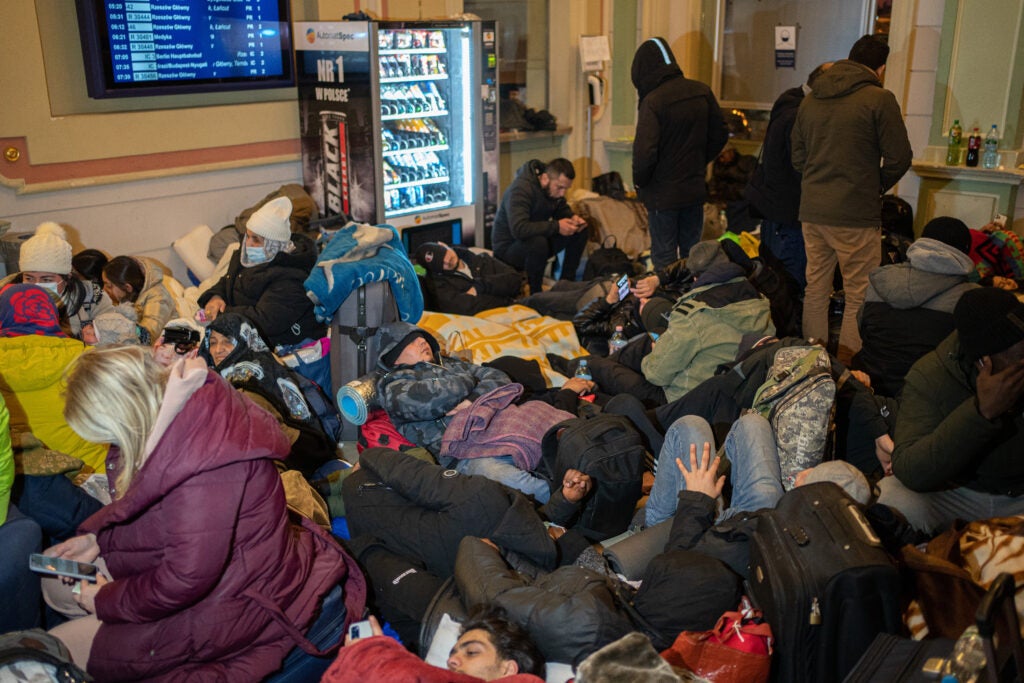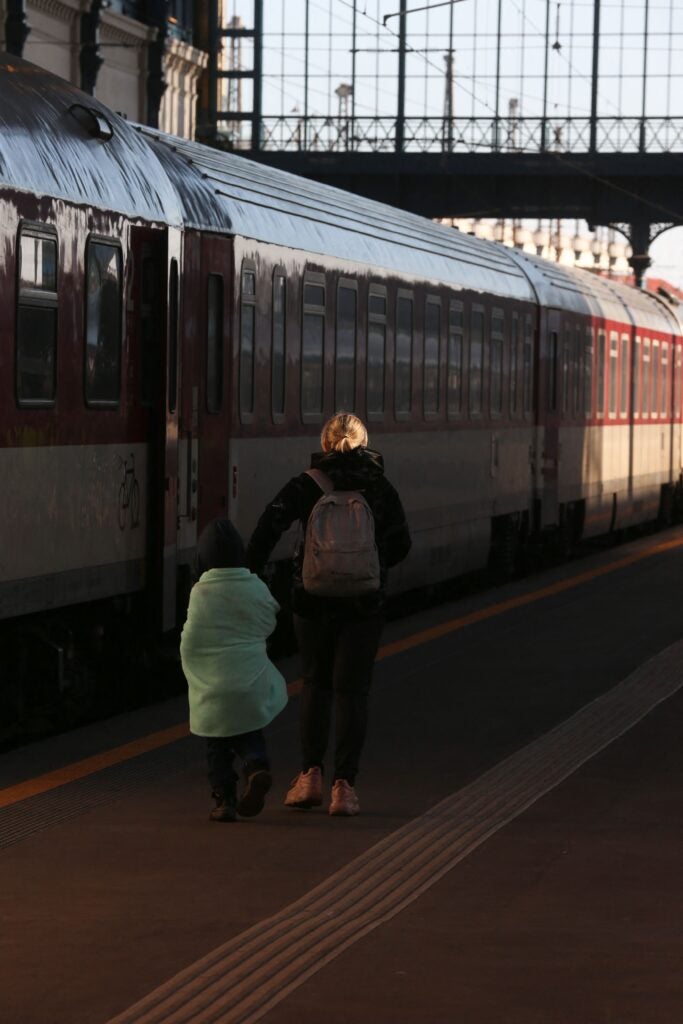
In the last week, since Russia’s initial invasion of Ukraine, around 660,000 Ukrainian refugees have fled to neighbouring countries, according to the latest government data compiled by UNHCR, the UN Refugee Agency.
Railways have been an important asset for the movement of people and essential humanitarian goods, as well as playing a vital strategic role in the conflict between Russia and Ukraine. With the closure of Ukraine’s airspace for civil aviation, many citizens were left with no option but to travel by car or bus, or hope to find transport out of the country by rail. There were even reports of some refugees walking for a day in order to find safety.
Following the declaration of martial law on 24 February, Ukrainian men aged between 18-60 are not allowed to leave the country. Priority is currently being given to children, women, and the elderly, but it remains to be seen how the country’s rail infrastructure will deal with the crisis.

Discover B2B Marketing That Performs
Combine business intelligence and editorial excellence to reach engaged professionals across 36 leading media platforms.
There is still a considerable strain on the country’s rail lines. Ukrainian trains are still in service, but due to the large influx of people trying to travel, stations are over capacity. Tickets are becoming harder to find; some services are fully booked.
Travel within Ukraine and Russia
Ukrainian Railways (UZ) has been operating a number of trains to Poland, Hungary, Slovakia, and the Czech Republic, with a separate transport hub at Čop railway station, located near the border of Ukraine, Slovakia, and Hungary. Additional evacuation routes are being scheduled from Kyiv to the Western regions of Ukraine as a contingency plan.
A humanitarian centre has been created at Kyiv Central Station, with 60 volunteers who speak foreign languages working at the station to help passengers. UZ confirmed there is enough rolling stock to be able to transport roughly 5,000 passengers a day from Kyiv.
Meanwhile, Russian Railways has extended its service, organising more than 5,000 additional seats on trains from the cities of the South of Russia than regular service. Russian Railways said last week that it was working to dispatch additional trains from several southern cities including Adler, Anapa, Novorossiysk, and Sochi. Ticket prices are capped to prevent the increased demand from affecting the cost of travel for passengers, according to the operator.

US Tariffs are shifting - will you react or anticipate?
Don’t let policy changes catch you off guard. Stay proactive with real-time data and expert analysis.
By GlobalDataIn a statement, The Russian Transport Ministry said: “Due to the temporary suspension of the work of airports in the south of the country, the Transport Ministry of Russia will carry out prompt transportation of any Russian and other citizens who want to leave by rail and by bus.”

Freight services between Ukraine and Russia have broken down completely. This is in part due to the fact that UZ has confirmed it has terminated all relations with Russian Railways, with hopes of working with the EU to move rail freight from China to Europe. However, the company is also implementing its defence strategy, to disrupt railway lines between Russia and Ukraine to prevent the former from using the infrastructure of the latter.
In a statement, UZ stated: “Railroad crossings between countries that used to transport thousands of goods and bring millions of dollars to the economies of both countries have been destroyed.”
The national operator confirmed today, however, that freight services are running within the country for key resource logistics. UZ will deliver more than 40 coal cars to ArcelorMittal Kryvyi Rih on a new route. The supply of this critical raw material for steel production previously passed through the Ukrainian-Russian border, which is impossible given the circumstances.
“Ukrainian railways employees will deliver the cargo on a new route despite the risks of shelling and attacks by sabotage groups. The company will also do everything possible to protect personnel. Train security will be strengthened because the safety of the personnel is also an important priority,” said Alexander Kamyshin, UZ Chairman.
Coal delivery to the steel plant is extremely important for Ukraine, as, without fuel, steel furnaces may stop functioning. Ukraine is heavily reliant on metallurgy for its economy, as the world’s 13th largest producer of steel and fifth largest exporter of iron ore by volume. Roughly 80% of its steel output is exported.
Neighbouring railway response
As the Ukrainian railway struggled to handle the growing number of passengers, neighbouring countries stepped in to offer aid.
Passengers with a Ukrainian passport or ID card are able to travel for free on services in Poland, Germany, Austria, Slovakia, Hungary, Denmark, and the Czech Republic. International high-speed operator Thalys and operators in Finland and the Netherlands have also offered their support in helping refugees.
Over 350,000 people have entered Poland from Ukraine since Russia began its invasion, according to the Polish Government. Many have made the journey by train, and Polish operator PKP Intercity has been offering support.
According to Andrzej Adamczyk, Polish Minister of Infrastructure: "Polish railway workers support their neighbours from Ukraine. For the coming weeks, PKP Intercity trains will transport all those who escape from the war. Thanks to free travel on the trains of the national carrier, refugees will reach safe places where the Polish community will support them."
Currently, there are direct PKP Intercity trains between Poland and Ukraine and the Polish operator has announced that these are being strengthened on the Polish section. Additional staff are also being deployed at Przemyśl Główny Station 24 hours a day.
"The service of railway staff takes on a unique dimension in the current situation. We would like to thank our employees for their diligent performance of their duties. Ukrainian citizens need our support, and receive this help," Marek Chraniek, President of the management board of PKP Intercity, said in a statement.

On 26 February, PKP Intercity also sent an adapted train fitted with camp beds and medical equipment to Ukraine, designed for injured passengers. The train also carried essential products including medical equipment, food, and blankets. A similar train operated from the Bohemia region of the Czech Republic on the same day.
Authorities in the Czech Republic have set up a four-tier plan to help refugees arriving in the country. The country is currently at level two, which secures aid and accommodation for up to 5,000 people, with more anticipated to arrive in the coming days. Although not directly bordering Ukraine, the close proximity has allowed the Czech Republic to work with neighbouring Poland and Slovakia to offer aid.
Czech operator RegioJet, together with freight carrier ČD Cargo and Rail Cargo Group, is providing a daily "rail bridge" humanitarian train service between Ukraine and Prague. The 20-carriage daily service will carry humanitarian supplies to Ukraine, and transport refugees on the return trip.
In cooperation with Ukrainian Railways, RegioJet will run from Kyiv to Lviv and then as night trains from Przemyśl to Prague.
A humanitarian crisis
Humanitarian charity People in Need is organising humanitarian aid logistics, with the Czech freight carrier ČD Cargo and the Austrian company Rail Cargo Group providing trucks and cargo services. RegioJet is organizing the passenger service out of Ukraine.
"The needs of Ukraine are huge. We are sending the first convoy of humanitarian aid to Lviv and we will continue deliveries in trucks and by rail. We thank donors who provide free provision according to the requirements of the Ukrainian side," explains Šimon Pánek, director of People In Need.
Humanitarian services are also being operated by Czech Railways (ČD), the main rail operator in the country. The services will take Ukrainian citizens who want to return to their home country, as well as humanitarian workers and goods, from the Czech republic into Ukraine. ČD has also set up humanitarian collections at 63 Czech train stations.
In Slovakia, the state-run passenger carrier ZSSK has suspended all trains travelling to Ukraine until further notice.
However, ZSSK is actively involved in the safe evacuation of Ukrainian citizens, working with Czech operators. on Sunday 27 February, an evacuation train from Čop, which was headed to Prague and Pilsen, was sent in cooperation with the Czech Arriva. ZSSK is also working with ČD to send another humanitarian train to help the citizens of Ukraine.
"We have activated the crisis staff of ZSSK and are in contact with the transport ministry, discussing further steps and assistance for our neighbour, like the potential provision of evacuation trains for war refugees," announced Roman Koreň, chair of the board of directors of ZSSK.

Hungarian national operator MÁV-Start has announced that passengers from Ukraine travelling to destinations within Hungary could do so for free regardless of their citizenship, and additional capacity has been added to trains operating to the border and in Eastern Hungary.
According to the operator, between 6pm on Saturday and 8am Sunday, nearly 1,500 people arrived in Záhony by train. Záhony, a border town, is located less than 10km from Čop, across the Tisza River.
All suitable rooms at Záhony station have been opened to refugees. Waiting rooms were also kept open overnight at Debrecen, Mátészalka, Nyíregyháza, and Vásárosnamény.
In a statement, the operator said: "From Saturday [27 February] midnight, passengers arriving from Ukraine can continue their journey to any destination in Hungary with a free "solidarity ticket". The exemption is also valid for international trains to other foreign destinations via Hungary to the Hungarian border station."
At Záhony station and at Budapest Keleti, the capital's main railway station, volunteers from the Hungarian Reformed Charity Service and the Red Cross are providing care and assistance in arriving at the administration.
For the latest news surrounding the conflict in Ukraine, view our special report.





